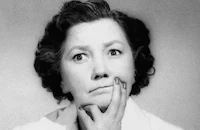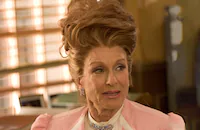This mostly family-friendly (PG-rated) movie was typical of a major component of the Walt Disney Productions output of the time: live-action adventures, fantasies and comedies produced between the great animated classics of the 1940s and 1950s and the heyday of blockbuster full-length cartoons ushered in by The Little Mermaid (1989).
The story, as Vincent Canby summarized it in his positive New York Times review, is about "an energetic young Presbyterian minister who mobilizes the women of his parish to fight organized crime in his small, otherwise ideal community."
The screenplay is based loosely on the true story of the Rev. Albert Fay Hill, of New Rochelle, N.Y., as recounted in his 1968 book of the same name. A civil rights and arts advocate who worked with the FBI to combat organized crime in the town, Hill got Duke Ellington and Ravi Shankar to perform at the church and baseball legend Jackie Robinson to preach there. The British release title, Hill's Angels, is a play on his name.
In the movie, the Rev. Michael Hill is joined by a ragtag band of locals, including a soccer mom (before that term was in common use), a divorcee with too much time on her hands and a frazzled housewife, among others. They are played by a cast who, despite their many stage and screen credits, were also well known to audiences at the time for their television work: Edward Herrmann (in Lou Gehrig and FDR TV biopics in 1976 and 1977), Susan Clark (biopics of Babe Didrikson and Amelia Earhart in 1975 and 1976), Karen Valentine (the sitcom Room 222 and her eponymous series in 1975), Michael Constantine (Valentine's Room 222 co-star), Cloris Leachman (despite her Supporting Actress Oscar for The Last Picture Show, 1971, most widely seen as the good-hearted but annoying neighbor on The Mary Tyler Moore Show and in her starring role in the spin-off series Phyllis).
The cast also featured Tony Award winner Barbara Harris and veteran character actress Patsy Kelly, making her final film appearance.
This was the first feature film for director Bruce Bilson, who up to this time was better known for his TV work on such series as Wonder Woman, Alice, S.W.A.T. and The Brady Bunch. After this picture, he went back almost exclusively to TV directing for the rest of his career.
Associate Producer Kevin Corcoran's career began as a child actor, reaching stardom in the Disney films Old Yeller (1957), The Shaggy Dog (1959), Pollyanna (1960), Swiss Family Robinson (1960) and others, including some Disney-produced TV shows. His career behind the camera was launched as associate producer of the studio's Return from Witch Mountain (1978).
One thing that most likely helped earn the film its PG rating was what Canby called "a discreetly violent scene in which a Presbyterian church is fire-bombed." According to imdb.com, there was no film in the camera when the fictional building was blown up so it had to be rebuilt and exploded again.
The real North Avenue Presbyterian Church was never fire-bombed but had fallen into disuse and shabbiness by the time the movie was released. It was sold to the city and stood vacant for more than 30 years until it was bought by Clara and Mariano Rivera. After a $3 million restoration, it was reopened as the home of Refugio de Esperanza, a Pentecostal congregation led by Clara. Mariano, a former pitcher for the New York Yankees, was the last major leaguer to wear the uniform number 42 before it was retired in 2013 in honor of its most famous wearer, Jackie Robinson.
Director: Bruce Bilson
Producer: Ron Miller
Screenplay: Don Tait
Cinematography: Leonard J. South
Editing: Gordon D. Brenner
Art Direction: Jack T. Collis, John B. Mansbridge
Music: Robert F. Brunner
Cast: Edward Herrmann (Michael Hill), Barbara Harris (Vickie), Susan Clark (Anne), Karen Valentine (Jane), Michael Constantine (Marv), Cloris Leachman (Claire)
By Rob Nixon
The North Avenue Irregulars

Brief Synopsis
When crooks set up operations in a traditional town, a minister and a group of church ladies are willing to do anything, no matter how wacky, to get them out.
Cast & Crew
Read More
Bruce Bilson
Director
Douglas Fowley
Delaney Rafferty
Tom Pedi
John Wheeler
Ceil Cabot
Patsy Kelly
Film Details
Also Known As
Hill's Angels, North Avenue Irregulars
MPAA Rating
Genre
Comedy
Release Date
1979
Technical Specs
Duration
1h 39m
Sound
Mono
Color
Color (Technicolor)
Theatrical Aspect Ratio
1.85 : 1
Synopsis
When crooks set up operations in a traditional town, a minister and a group of church ladies are willing to do anything, no matter how wacky, to get them out.
Director
Bruce Bilson
Director
Cast

Douglas Fowley
Delaney Rafferty
Tom Pedi
John Wheeler
Ceil Cabot

Patsy Kelly
Dena Dietrich
John Kerry
Rickie Layne
Damon Raskin

Alan Hale Jr.
Herbert Voland
Linda Lee Lyons
Steve Franken
Dick Fuchs

Frank Campanella
Jack Cameron White
David Rode

Edward Herrmann
Karen Valentine

Kim Bullard
Virginia Capers

Cliff Osmond
Ed Mccready
Pitt Herbert
Dave Ketchum
Carl Ballantine
Ivor Francis
Walt Larue
Ruth Buzzi

Cloris Leachman
Roger Creed
Michael Constantine

Susan Clark
Michael Lloyd
Jack Griffin
Douglas Hume
Dennis Robertson
Dave Morick
Barbara Harris
Louisa Moritz
Jack Perkins
Bill Mclean
Mickey Morton
Len Ross
Gary Morgan
Bobby Rolofson

Marjorie Bennett
Chuck Henry
Darrow Igus
Melora Hardin
Crew
Eddie Barron
Hair
John Bloss
Production Manager
Gordon D Brenner
Editor
Robert F. Brunner
Music
Randy B Carter
Assistant Director
Jack T. Collis
Art Director
Kevin Corcoran
Associate Producer
Art Cruickshank
Special Effects
Eddy Donno
Stunt Coordinator
Joe Hale
Titles
Ben F Hendricks
Sound Editor
Rev Albert Fay Hill
Source Material (From Novel)
Joel Hirschhorn
Music
Al Kasha
Music
Chuck Keehne
Costumes
Danny Lee
Special Effects
Tom Leetch
Producer
Eustace Lycett
Special Effects
Henry A Maffett
Sound
John Mansbridge
Art Director
Ron Miller
Producer
Norman Rockett
Set Decorator
Robert J. Schiffer
Makeup
Christopher Seiter
Production Manager
Christopher Seiter
Assistant Director
Walter Sheets
Original Music
Leonard J South
Director Of Photography
Art Stevens
Titles
Emily Sundby
Costumes
James Tadevic
Location Manager
Don Tait
Screenplay
Herb Taylor
Sound Supervisor
Videos
Movie Clip


Film Details
Also Known As
Hill's Angels, North Avenue Irregulars
MPAA Rating
Genre
Comedy
Release Date
1979
Technical Specs
Duration
1h 39m
Sound
Mono
Color
Color (Technicolor)
Theatrical Aspect Ratio
1.85 : 1
Articles
The North Avenue Irregulars

The North Avenue Irregulars
This mostly family-friendly (PG-rated) movie was typical of a major component of the Walt Disney Productions output of the time: live-action adventures, fantasies and comedies produced between the great animated classics of the 1940s and 1950s and the heyday of blockbuster full-length cartoons ushered in by The Little Mermaid (1989).
The story, as Vincent Canby summarized it in his positive New York Times review, is about "an energetic young Presbyterian minister who mobilizes the women of his parish to fight organized crime in his small, otherwise ideal community."
The screenplay is based loosely on the true story of the Rev. Albert Fay Hill, of New Rochelle, N.Y., as recounted in his 1968 book of the same name. A civil rights and arts advocate who worked with the FBI to combat organized crime in the town, Hill got Duke Ellington and Ravi Shankar to perform at the church and baseball legend Jackie Robinson to preach there. The British release title, Hill's Angels, is a play on his name.
In the movie, the Rev. Michael Hill is joined by a ragtag band of locals, including a soccer mom (before that term was in common use), a divorcee with too much time on her hands and a frazzled housewife, among others. They are played by a cast who, despite their many stage and screen credits, were also well known to audiences at the time for their television work: Edward Herrmann (in Lou Gehrig and FDR TV biopics in 1976 and 1977), Susan Clark (biopics of Babe Didrikson and Amelia Earhart in 1975 and 1976), Karen Valentine (the sitcom Room 222 and her eponymous series in 1975), Michael Constantine (Valentine's Room 222 co-star), Cloris Leachman (despite her Supporting Actress Oscar for The Last Picture Show, 1971, most widely seen as the good-hearted but annoying neighbor on The Mary Tyler Moore Show and in her starring role in the spin-off series Phyllis).
The cast also featured Tony Award winner Barbara Harris and veteran character actress Patsy Kelly, making her final film appearance.
This was the first feature film for director Bruce Bilson, who up to this time was better known for his TV work on such series as Wonder Woman, Alice, S.W.A.T. and The Brady Bunch. After this picture, he went back almost exclusively to TV directing for the rest of his career.
Associate Producer Kevin Corcoran's career began as a child actor, reaching stardom in the Disney films Old Yeller (1957), The Shaggy Dog (1959), Pollyanna (1960), Swiss Family Robinson (1960) and others, including some Disney-produced TV shows. His career behind the camera was launched as associate producer of the studio's Return from Witch Mountain (1978).
One thing that most likely helped earn the film its PG rating was what Canby called "a discreetly violent scene in which a Presbyterian church is fire-bombed." According to imdb.com, there was no film in the camera when the fictional building was blown up so it had to be rebuilt and exploded again.
The real North Avenue Presbyterian Church was never fire-bombed but had fallen into disuse and shabbiness by the time the movie was released. It was sold to the city and stood vacant for more than 30 years until it was bought by Clara and Mariano Rivera. After a $3 million restoration, it was reopened as the home of Refugio de Esperanza, a Pentecostal congregation led by Clara. Mariano, a former pitcher for the New York Yankees, was the last major leaguer to wear the uniform number 42 before it was retired in 2013 in honor of its most famous wearer, Jackie Robinson.
Director: Bruce Bilson
Producer: Ron Miller
Screenplay: Don Tait
Cinematography: Leonard J. South
Editing: Gordon D. Brenner
Art Direction: Jack T. Collis, John B. Mansbridge
Music: Robert F. Brunner
Cast: Edward Herrmann (Michael Hill), Barbara Harris (Vickie), Susan Clark (Anne), Karen Valentine (Jane), Michael Constantine (Marv), Cloris Leachman (Claire)
By Rob Nixon
Quotes
How come he doesn't have any pants on?- Bette Sims
Well, we - we don't know why, we - we don't question why.- Mrs. Vicki Sims
Why don't we? Did we also posed that daddy has pants on, when he doesn't?- Bette Sims
Mm-hmm, Yeah.- Mrs. Vicki Sims
If you loose, does the treasury department give you back your money?- Claire
I thought so. Here's your order, lady.- Ticket Giver
And next time, take your business someplace else!- Ticket Giver
Did you have to wear that? We look like the Sabobsy twins.- Mrs. Rose Rafferty
Or triplets.- Mrs. Vicki Sims
I want that money back, and if I don't get it, I will go straight to the police.- Rev. Michael Hill
Now we don't want any trouble.- Harry the Hat
I'd like to stick it to 'em good!- Jane
Trivia
Miscellaneous Notes
Released in United States Winter February 1979
Released in United States Winter February 1979













